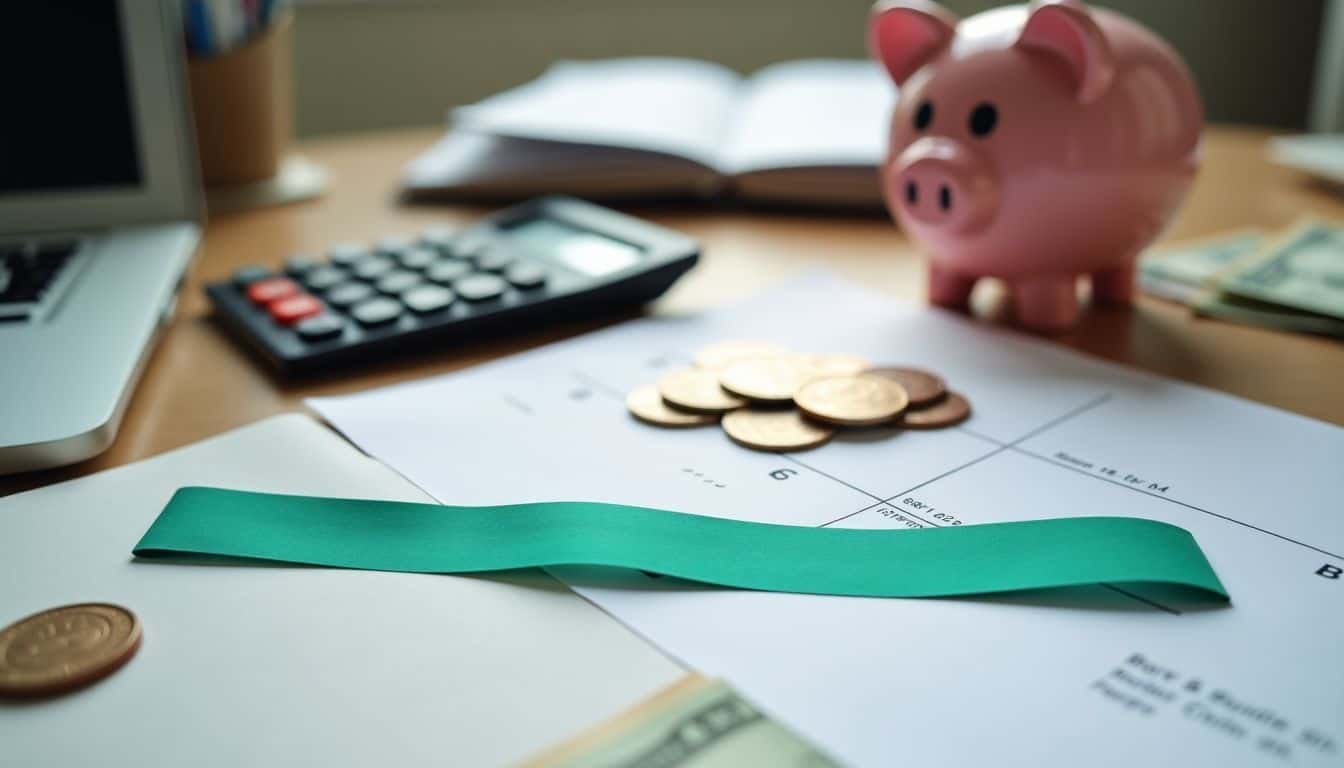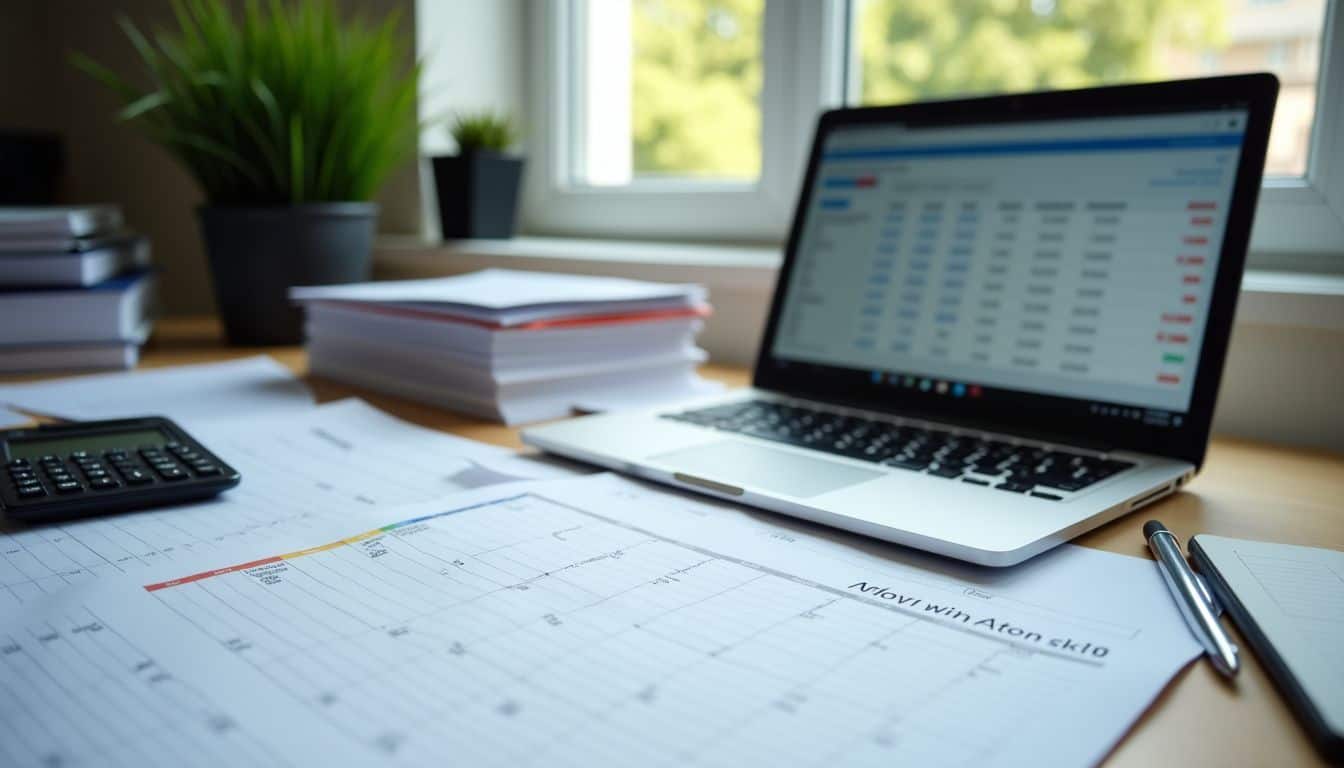Almost half of Americans struggle to pay an unexpected $400 expense, according to recent studies. Learning how to prepare for unexpected expenses can save you from financial stress and sleepless nights.
These seven simple steps will help you build a safety net and face money surprises with confidence.
Key Takeaways
Build an emergency fund starting with $1,000, then grow it to cover 3–6 months of expenses through automatic savings transfers.
Follow the 50-30-20 budget rule: 50% for needs, 30% for wants, and 20% for savings. Include a 5-10% buffer in your monthly budget for surprise costs.
Keep credit card usage under 30% of your limit and maintain old accounts to protect your credit score. Nearly half of Americans struggle with unexpected $400 expenses.
Create multiple income streams through side hustles like teaching or coaching. Sell unused items online or through garage sales for quick cash.
Use bank services like Huntington’s Standby Cash ($100-$500) instead of costly payday loans. Set up these options before emergencies strike.
Table of Contents
Build an Emergency Fund

An emergency fund serves as a financial safety net for unexpected expenses. Begin by saving $1,000, then gradually build it up to cover three to six months of essential costs.
Set a savings goal

Start with a small savings goal of $1,000. This target feels less scary and more doable for most guys. Break down this goal into monthly chunks – putting aside $20, $50, or $100 each month makes the process manageable.
Your emergency fund grows steadily through these regular deposits.
Small steps today create financial security tomorrow.
A wise financial strategy involves following the 50-30-20 rule for your budget. Put 50% toward needs like rent and food, 30% for fun stuff, and set aside 20% in your savings account. Tax refunds offer a perfect chance to boost your emergency fund fast – just set up direct deposit straight to your savings.
This method builds your safety net without much daily thought.
Automate your savings

Setting savings goals leads to better results with automatic transfers. Your bank can move money from checking to savings without your input. Tools like Money Scout from Huntington Bank make this process simple.
The system moves $5-$50 into savings based on your spending patterns and account balance.
Advanced banking apps now streamline the process of building emergency funds. I set up automatic transfers on payday through online banking last year. This method grew my savings faster than manual deposits.
The key is to pick a fixed amount that fits your budget. Your checking account won’t miss small, regular transfers. Mobile banking alerts keep you informed about each successful transfer to your savings account.
Create a Flexible Budget

A flexible budget helps you deal with life’s money surprises without stress. Your budget should be flexible, allowing for adjustments without reaching a breaking point.
Include a miscellaneous category

Allocate 5-10% of your monthly income to a miscellaneous category for unexpected expenses, such as a broken phone charger or an unplanned gift. Tracking these costs in your checking account ensures you set aside the right amount each month.
The key is to track these expenses in your checking account, so you’ll know exactly how much to set aside each month.
The best budgets plan for the unplanned. – Dave Ramsey
This flexible spending approach proved valuable when an unexpected expense arose, such as replacing a broken coffee maker for $75. The miscellaneous fund covered the cost without dipping into emergency savings or accumulating credit card debt.
Effective budgeting allows for life’s small surprises while maintaining financial stability and reducing stress.
Adjust for overlooked expenses

Many men overlook essential expenses in their monthly budgets, such as groceries, home maintenance, car repairs, and children’s activities. This becomes evident when tracking spending over time.
For example, after using EveryDollar for six months, one user discovered they were consistently spending $200 more on groceries than initially planned.
Smart budgeting means spotting these hidden costs faster. Set aside extra cash for routine maintenance and surprise bills in your flexible spending account. My rule: add 15% to basic expense estimates for a safety net.
This buffer helps cover those hidden costs that pop up in daily life. The checking account stays healthy, and stress stays low.
Reduce Financial Risks

Financial risks can hit your wallet hard if you don’t plan ahead. Smart insurance choices and a solid backup plan will shield you from sudden money troubles that pop up in life.
Maintain adequate insurance coverage

Insurance acts as your shield against life’s costly surprises. Your health insurance needs regular check-ups to match your current health risks. Smart men review their coverage limits each year and adjust their deductibles based on their savings.
I learned this lesson after paying $5,000 out-of-pocket for a medical procedure my basic plan didn’t cover.
A solid insurance strategy must include both FSAs and HSAs to handle healthcare costs. These tax-advantaged accounts help you save money for medical bills while lowering your taxable income.
My FSA saved me $800 last year on dental work and prescription medications. Your insurance portfolio should match your life stage – single guys might focus on disability coverage, while fathers need life insurance to protect their families.
Plan for major life events

Major life events can bring unexpected financial challenges. Responsible individuals plan ahead by obtaining life insurance to safeguard their family’s finances. Additionally, long-term care insurance helps cover medical expenses as they grow older.
Both types of coverage act as safety nets for your loved ones. A solid financial plan must include these basic protections to avoid money troubles later.
You need to think about big expenses before they pop up. Start by making a list of possible costs – like home repairs, medical bills, or job changes. Put money aside each month into a savings account marked for these events.
Learning how to fill out a loan application gives you another backup option. Your next step focuses on finding ways to earn extra cash through side work.
Explore Additional Income Sources

Extra cash helps you build a safety net faster. You can start a side business from home or sell items online through popular marketplaces during your free time.
Take on a side hustle
Side hustles give you the power to control your work and schedule. You can pick tasks that match your skills and interests. I started my first side gig three years ago, teaching guitar lessons on weekends.
The freedom to choose my hours made it easier to balance with my main job. Many guys find success with sports related side hustles like coaching or refereeing local games.
Success doesn’t come from what you do occasionally, it comes from what you do consistently.
Your effort and drive matter more than natural talent in side hustling. The key lies in staying determined and adapting to changes. Start small with tasks you enjoy, then grow your income steadily.
My guitar lessons grew from two students to fifteen within six months. The extra money helped build my emergency fund while doing something I loved. Smart moves include using your current skills, testing different ideas, and staying flexible with your approach.
Sell unused items
Your unused items can turn into quick cash through online marketplaces. List your electronics, jewelry, or other valuable items on popular selling platforms to reach more buyers. A garage sale offers another great way to clear out clutter and make money fast.
I made $500 last month by selling my old gaming console and unused kitchen gadgets online.
Smart pricing and clear photos help items sell faster on these platforms. Take good pictures of your items in natural light. Clean everything before listing it for sale. Your next step involves exploring credit options as a backup plan for emergencies.
Use Credit Responsibly

Smart credit habits build a strong financial future. Your credit score opens doors to better loan rates and credit card rewards, so keep your balances low and pay bills on time.
Improve your credit score
Your credit score needs regular care to stay healthy. Payment history makes up 35% of your FICO score, so paying bills on time matters most. Set up automatic payments through your bank to avoid missed due dates.
Keep your credit card balances low – experts suggest using less than 30% of your available credit limit.
Check your credit report every few months for errors or signs of fraud. You can get free reports from major credit bureaus. If you spot mistakes, file a dispute right away. Small errors can drop your score by many points.
Focus on building good credit habits like paying in full each month and keeping old accounts open to show a longer credit history.
Keep a low credit utilization rate
A strong credit score leads right to smart credit use. Smart guys know the magic number for credit limits – stay under 30% usage at all times. This means if you have a $10,000 credit limit, keep your spending below $3,000.
Credit card companies love to see this low usage rate.
Many men make the mistake of closing old credit cards they don’t use anymore. Keep those accounts open! The total available credit helps lower your overall usage rate. I learned this the hard way after closing three old cards – my credit score dropped 50 points that month.
Smart credit use means spreading purchases across multiple cards to keep individual card usage low. This strategy works great for big expenses like car repairs or home maintenance costs.
Develop a Contingency Plan

Life is unpredictable, making it essential to plan ahead for financial challenges. A well-structured contingency plan outlines specific steps for managing cash emergencies, whether by accessing an emergency fund, utilizing credit cards, or securing short-term loans.
Identify potential unexpected expenses
Unexpected expenses can put a strain on your finances without warning. Medical bills arise from accidents or sudden illnesses, car repairs become urgent after breakdowns, and home maintenance issues, such as burst pipes or faulty appliances, require immediate attention.
Job loss leads to a sudden loss of income, making quick access to funds essential for financial stability. These expenses often range from hundreds to thousands of dollars at once.
Smart planning starts with listing common surprise expenses in your life. Check your past bank statements for irregular costs from the last year. Mark down seasonal expenses like property taxes or insurance deductibles.
Track maintenance schedules for your car and home systems. A clear view of potential costs helps you set the right savings targets for your emergency fund.
Have a plan for accessing quick cash
Quick access to cash helps you handle sudden money needs without stress. Huntington Bank’s Standby Cash offers fast access to $100-$500 with a small 5% fee. Your credit score stays safe because this service checks your account history instead of credit reports.
Smart planning means keeping this option ready before you need it.
Many banks now offer similar emergency cash services through their mobile apps or websites. The key lies in setting up these services before crisis hits. I learned this lesson after my car broke down last month – having quick cash access saved me from missing work.
The best part? These services often cost less than credit card cash advances or payday loans.
People Also Ask
What’s the first step to handle unexpected expenses?
Start by building an emergency fund in a savings account. Put money from your paychecks into this account until you have enough to cover 3–6 months of expenses. This helps with surprise costs like car repairs or medical bills.
Should I get a personal loan for emergency expenses?
While personal loans and lines of credit can help, they should be your backup plan. Check your credit score first, and compare interest rates. Remember, loans must be paid back, so use them wisely.
How can I prevent financial stress from surprise costs?
Set up automatic payroll deductions for your emergency savings. Also look into preventative measures like home maintenance, car maintenance, and high-deductible health plans with a health savings account.
What role does insurance play in protecting against unexpected costs?
Life insurance policies and home loans can provide safety nets. Good coverage helps with medical expenses, property damages, and home repairs. Talk to financial advisors about the right insurance for your needs.
How can I avoid overdraft fees when emergency expenses hit?
Link your checking account to a savings account for overdraft protection. Some banks offer special programs to help avoid overdraft fees. Watch your account balance closely during tough times.
What if my emergency fund isn’t enough?
Look into options like home equity lines of credit, cashback credit cards, or debt consolidation. Be careful with adjustable rate mortgages. Consider talking to a registered investment advisor about smart ways to use your assets.
References
https://www.rivermarkcu.org/blog/savings-strategies/7-easy-steps-to-build-an-emergency-fund/
https://bnh.bank/blog/emergency-funds/
https://www.finra.org/investors/insights/prepare-survive-financial-hardship (2024-04-30)
https://www.merrilledge.com/article/how-to-prepare-for-unexpected-financial-events
https://www.threads.net/@manifestwithtani/post/DCsl1UshXvk (2024-11-22)
https://www.csefcu.com/blog/post/turn-your-clutter-into-cash-best-practices-for-selling-unused-items
https://www.gncu.org/blog/8-tips-to-improve-your-credit-score/
https://bettermoneyhabits.bankofamerica.com/en/credit/how-to-improve-your-credit-score
https://www.jeniusbank.com/blog/articles/lower-credit-utilization-ratio
https://www.experian.com/blogs/ask-experian/ways-to-keep-credit-utilization-low/ (2021-10-22)
https://fastercapital.com/topics/contingency-planning-for-unexpected-expenses.html
https://www.bankatfirst.com/personal/discover/flourish/prepare-for-unexpected-expenses.html

